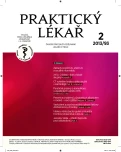-
Medical journals
- Career
Paretic symptoms and complications in aseptic CNS infections
Authors: D. Smíšková 1; O. Džupová 2; D. Pícha
Authors‘ workplace: 2. lékařská fakulta a Nemocnice Na Bulovce1. infekční klinikaPřednosta: doc. MUDr. Dušan Pícha, CSc. 1; Univerzita Karlova v Praze 1; 3. lékařská fakulta a Nemocnice Na BulovceKlinika infekčních nemocíPřednosta: prof. MUDr. Jiří Beneš, CSc. 2
Published in: Prakt. Lék. 2013; 93(2): 49-56
Category: Reviews
Overview
Despite a mostly benign clinical course, aseptic CNS infections can be complicated by paresis. Many viral and bacterial agents can cause CNS infection with paretic complication. In the Czech Republic neuroborreliosis, tick-born encephalitis and herpes virus CNS infections are the most frequent ones. The article offers a review of paresis associated with aseptic CNS infections and their etiological agents. Causative treatment is available for some infections provided that the diagnosis is promptly established. CSF examination is recommended in every patient with newly developed paresis. In adults, the non-infectious cause (stroke, mass lesion etc.) has to be diagnosed first, followed by CSF testing.
Keywords:
palsy – paresis – meningitis – encephalitis – myelitis – Lyme disease – tick-borne encephalitis – enterovirus – herpetic viruses
Sources
1. Love S, Wiley CA. Viral diseases. In: Graham DI, Lantos PL, (Eds.). Greenfields neuropathology. 7th ed. Vol. II. London: Arnold 2002; 1–106.
2. Solomon T, Willison H. Infectious causes of acute flaccid paralysis. Curr Opin Infect Dis 2003; 16(6): 375–381.
3. Irani DN. Aseptic meningitis and viral myelitis. Neurol Clin 2008; 26(6): 635–655.
4. Haglund M, Gunther G. Tick-borne encephalitis-pathogenesis, clinical course and long-term follow-up. Vaccine 2003; 21(Suppl 1): S11–18.
5. Smíšková D, Polívková S, Blechová Z, Marešová V. Klíšťová meningoencefalitida, klinický průběh a komplikace. Vakcinologie 2010; 4(3): 106–109.
6. Kaiser R. The clinical and epidemiological profile of tick-borne encephalitis in southern Germany 1994-98: a prospective study of 656 patients. Brain 1999; 122(11): 2067–2078.
7. Tyler KL. Emerging viral infections of the central nervous system: part 1. Arch Neurol 2009; 66(8): 939–948.
8. Částková, J. Vakcinace proti poliomyelitidě. Vakcinologie 2005; 1(2): 80–87.
9. Šoltysová K, Sojková N, Bronská E, Blechová Z, Marešová V. Broken seasonality - winter outbreak of enteroviral meningoencephalitis in children. Book of Abstracts, 4th World Congress of the World Society for Pediatric Infectious Diseases, Varšava 2005: p. 65.
10. Dhole TN, Ayyagari A, Chowdhary R, et al. Non-polio enteroviruses in acute flaccid paralysis children of India: vital assessment before polio eradication. J Paediatr Child Health 2009; 45(7–8): 409–413.
11. Steiner I, Kennedy PGE, Pachner AR. The neurotropic herpes viruses: herpes simplex and varicella-zoster. Lancet Neurol 2007; 6(11): 1015–1028.
12. Whitley R. Varicella-Zoster Virus. In Mandell G, Bennett JE, Dolin R. (Eds.). Principles and Practice of Infectious Diseases. 7th ed. Vol. 2. Philadelphia: Elsevier, Churchill Livingstone 2010; 1963–1971.
13. Kleinschmidt-DeMasters BK, Gilden DH. The expanding spectrum of herpesvirus infections of the nervous system. Brain Pathol 2001; 11(4): 440–451.
14. Giobbia M, Carniato A, Scotton PG, et al. Cytomegalovirus-associated transverse myelitis in a non-immunocompromised patient. Infection 1999; 27(3): 228–230.
15. Seeley WW, Marty FM, Holmes TM, et al. Post-transplant acute limbic encephalitis: clinical features and relationship to HHV6. Neurology 2007; 69(2): 156–165.
16. Černý R, Machala L. Neurologické komplikace HIV/AIDS. Praha: Karolinum 2007; 55–61.
17. Soltysova K, Smiskova D, Pícha D. Neuroborreliosis and tick born encephalitis - same vector, but different clinical disease. Poster. 17th European Congress of Clinical Microbiology and Infectious Diseases, 2007. Munich, Germany.
18. Halperin JJ. Nervous system Lyme disease. Infect Dis Clin North Am 2008; 22(2): 261–274.
19. Thaisetthawatkul PMD, Logigian ELMD. Peripheral nervous system manifestations of lyme borreliosis. J Clin Neuromuscul Dis 2002; 3(4): 165–171.
20. Dumler JS, Madigan JE, Pusterla N, Bakken JS. Ehrlichioses in humans: epidemiology, clinical presentation, diagnosis, and treatment. Clin Infect Dis 2007; 45(Suppl 1): S45–51.
21. Tsiodras S, Kelesidis I, Kelesidis T, et al. Central nervous system manifestations of Mycoplasma pneumoniae infections. J Infect 2005; 51(5): 343–354.
22. Michel D, Antoine JC, Pozzetto B, et al. Lumbosacral meningoradiculitis associated with Chlamydia pneumoniae infection. J Neurol Neurosurg Psychiatry 1992; 55(6): 511.
Labels
General practitioner for children and adolescents General practitioner for adults
Article was published inGeneral Practitioner

2013 Issue 2-
All articles in this issue
-
Basics of social cognitive and affective neuroscience
XVIII. On happiness – humans and human groups - Cardiac computed tomography and its importance in cardiology K
- Paretic symptoms and complications in aseptic CNS infections
- Family-based prevention of alcohol related problems – new findings
- Vascular and psychosocial risk factor of Alzheimer's disease
- Helicobacter pylori infection and immune thrombocytopenic purpura – a case report
-
Basics of social cognitive and affective neuroscience
- General Practitioner
- Journal archive
- Current issue
- Online only
- About the journal
Most read in this issue- Cardiac computed tomography and its importance in cardiology K
- Paretic symptoms and complications in aseptic CNS infections
- Helicobacter pylori infection and immune thrombocytopenic purpura – a case report
- Vascular and psychosocial risk factor of Alzheimer's disease
Login#ADS_BOTTOM_SCRIPTS#Forgotten passwordEnter the email address that you registered with. We will send you instructions on how to set a new password.
- Career

